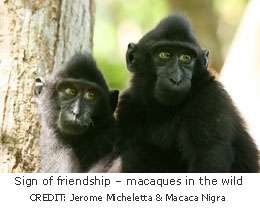January 12, 2012 report
Evolutionary psychologists find macaques more likely influenced by friends than family

(PhysOrg.com) -- In order to better understand human relationships, researchers who study such things often turn to other primates for the simple reason that they are more accessible, being locked up in zoos and such. Thus, PhD student Jerome Micheletta, at the University of Portsmith in the UK, found himself studying the crested macaque in the Marwell Wildlife Zoological Park. It was while doing so that he discovered that the macaques tended to follow the gaze of a friend more quickly than they did others, such as family members. Micheletta along with Dr. Dr Bridget Waller have published their findings on this research in the journal Animal Behavior.
When macaques are together, they tend to pair up with friends; other macaques that they spend more time with than others in the group. As part of their “friendship” pairs groom one another and pick off fleas, etc. And macaques, like people and many other animals, also note when other members of their group turn to look at something, and then turn to look as well to see what’s up. It is thought that such gaze following is a natural form of self-preservation. After all, if a predator has suddenly appeared behind you, and someone you are interacting with suddenly looks and sees them, it makes a lot of sense to turn and have a look yourself.
But what the two found surprising was the time lag between noting a change in gaze, and then in turning to look in response, with the macaques. They found that when it was a friend doing the gazing, there was little to no lag at all. But when it was anybody else, it took slightly longer, regardless of whether it was family or a group leader.
Micheletta and Waller don’t suggest they know for sure why this is, but do theorize that it might be because the macaques view their friends more importantly than they do others in the group, or that because of their bond, they look forward to sharing in whatever the other has found. Or, it also seems plausible that they simply trust their friends more, and thus don’t hesitate to turn and look when they see their friend has found something of interest.
The two researchers also hint that such behavior might shed some light on human relationships as well, but as yet, haven’t undertaken a study to find out if people would react the same way, and if they do, what it might mean.
More information: Press release
© 2011 PhysOrg.com


















